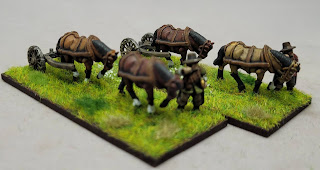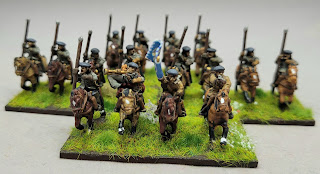Scotland the Brave: Part Four - Cavalry
Well I have finally stopped procrastinating and bought some Scottish lancers.
After the success of Leslie's lancers at Marston Moor most, if not all, Scots cavalry regiments ditched their armour and took up the lance. Many of the Scots regiments were struggling to arm their troopers with pistols anyway, whereas lances were easier to come by; plus the smaller Scots horses were much better suited to the role of light unarmoured cavalry rather than heavier harquebusiers.
Strangely, when Scots cavalry did have pistols they liked to carry as many as humanely possible; in some cases five pistols were carried, two in holsters, two tucked in boots and another tucked in at the waist. Sounds rather like Blackadder's cousin MacAdder "the most dangerous man to ever wear a skirt in Europe".
Which makes me sigh a deep sigh of relief. I had been toying with the idea of a regiment of lancers and a regiment of harquebusiers. Which would have involved lots of head swaps, and creativity as the range from which I have purchased my figures only has Scots cavalry in lance flavour. With a lancer regiment I only have three head swaps to make (officer, standard and trumpeter) as there is no Scots cavalry command in the range.
A quick rummage through the spares box provided me with a cavalry casualty figure, an officer and a standard bearer. So only Scots heads, troopers and a trumpeter to purchase.
A suitable regiment name and standard is the next issue. Recently I have been using the Marston Moor order of battle as my first port of call to name my units (assuming of course that their standards are known, or vaguely guessable). Alas none of the Scots cavalry standards at Marston Moor are known, apart from possibly Lord Leven's - which I have already utilised as his personal standard.
A quick cross reference of the BCW Regimental wiki and my copy of "Fahnen und Standarten...V" threw up the regiment of horse commanded by the terribly unScottish sounding Major General Sir John Browne of Fordell. This regiment fought at the siege(s) of Newark and was most likely lance armed (they received breast and backplates and pistols late in 1645) so we have a winner. Stuart at Maverick Models was happy to produce the standard for me.
As I have recently decided upon having dedicated casualty markers for specific regiments, I took the view that my harquebusier casualty figure was wholly inappropriate in a lobster pot and needed a bonnet. One slightly tricky, not to mention dangerous, head swap later and I have my man.
The only problem now is that, well, if I have a regiment that was at Newark it would be churlish not to have a representation of the Queen's Sconce...
After the success of Leslie's lancers at Marston Moor most, if not all, Scots cavalry regiments ditched their armour and took up the lance. Many of the Scots regiments were struggling to arm their troopers with pistols anyway, whereas lances were easier to come by; plus the smaller Scots horses were much better suited to the role of light unarmoured cavalry rather than heavier harquebusiers.
Strangely, when Scots cavalry did have pistols they liked to carry as many as humanely possible; in some cases five pistols were carried, two in holsters, two tucked in boots and another tucked in at the waist. Sounds rather like Blackadder's cousin MacAdder "the most dangerous man to ever wear a skirt in Europe".
Which makes me sigh a deep sigh of relief. I had been toying with the idea of a regiment of lancers and a regiment of harquebusiers. Which would have involved lots of head swaps, and creativity as the range from which I have purchased my figures only has Scots cavalry in lance flavour. With a lancer regiment I only have three head swaps to make (officer, standard and trumpeter) as there is no Scots cavalry command in the range.
A quick rummage through the spares box provided me with a cavalry casualty figure, an officer and a standard bearer. So only Scots heads, troopers and a trumpeter to purchase.
A suitable regiment name and standard is the next issue. Recently I have been using the Marston Moor order of battle as my first port of call to name my units (assuming of course that their standards are known, or vaguely guessable). Alas none of the Scots cavalry standards at Marston Moor are known, apart from possibly Lord Leven's - which I have already utilised as his personal standard.
A quick cross reference of the BCW Regimental wiki and my copy of "Fahnen und Standarten...V" threw up the regiment of horse commanded by the terribly unScottish sounding Major General Sir John Browne of Fordell. This regiment fought at the siege(s) of Newark and was most likely lance armed (they received breast and backplates and pistols late in 1645) so we have a winner. Stuart at Maverick Models was happy to produce the standard for me.
The only problem now is that, well, if I have a regiment that was at Newark it would be churlish not to have a representation of the Queen's Sconce...
If you enjoyed reading this, or any of the other posts, please consider supporting the blog.
Thanks.











Another nice unit to compliment your force. The think about unit flags in the BCW is that we tend to know more about those captured after a crushing defeat. So, we know lots about the Scots’ colours at Preston and Dunbar! :-)
ReplyDeleteThanks, if you haven't seen the German language book on BCW flags http://www.keepyourpowderdry.co.uk/2017/12/fahnen-und-standarten.html?m=1 it is absolutely brilliant. Full colour illustrations, German text isn't really as an issue.
ReplyDeleteThat looks brilliant. Good to have it all in one place and I’m sure it will fill a few gaps! Definitely one for the Christmas list :)
Delete